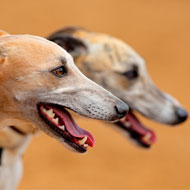Concerns over racing greyhounds during heatwave

Campaigners said racing dogs in hot weather contradicts advice being given to dog owners about caring for their pets in a heatwave.
Lobby groups are raising concerns about the welfare of greyhounds being raced during soaring temperatures at tracks across the UK.
Campaigners from the League Against Cruel Sports (LACS) and Greyt Exploitations said racing puts the dogs at risk of heatstroke and contradicts advice being given to dog owners about caring for their pets in a heatwave.
The groups are calling for a cap on the maximum temperature in which dogs can be raced.
A hot weather advice note was issued on 2 July by the Greyhound Board of Great Britain (GBGB), which is the self-regulatory body for greyhound racing. A further warning was published last week, but stresses that it is for the tracks to consider whether they should cancel or suspend racing.
The statement reads: ‘The first point within our GBGB Greyhound Commitment states that “Greyhound Welfare and safety is at the heart of everything we do”.
‘We find ourselves within the hottest prolonged start to the Summer since 1967 and with Thursday’s temperatures likely to hit 34-degrees, it is matter of real concern not only for the GBGB, but trainers, owners and promoters…’
Nick Weston, head of campaigns at LACS said that in offering hot weather advice, the racing board “has not gone far enough” and questioned why there are no rules to prevent dogs racing in extreme temperatures.
In its latest statement, GBGB said that while its officials cannot attend every single race meeting, when they do attend, they routinely monitor the temperatures of trainers’ vehicles. In addition, the racing body said that the veterinary surgeon officiating at each track can make a recommendation to suspend racing if they have concerns about the heat.
GBGB added that it is working with stakeholders on a review of extreme weather, to one day ‘provide clear and unambiguous guidance to everyone concerned’.



 The Animal and Plant Health Agency (APHA) has updated its online reporting service for dead wild birds.
The Animal and Plant Health Agency (APHA) has updated its online reporting service for dead wild birds.